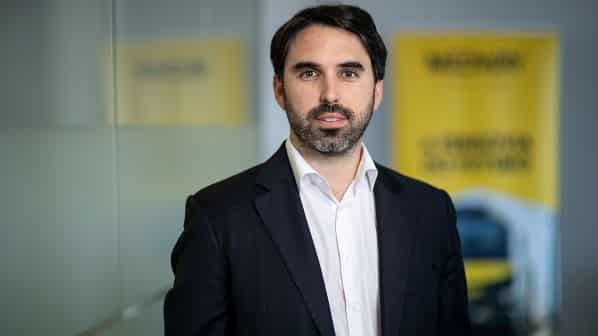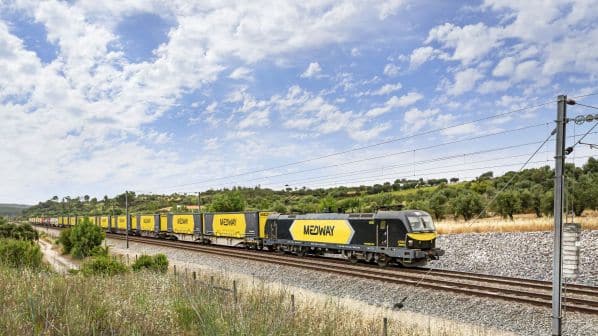CREATED through the privatisation of CP Cargo in January 2016, when it was sold to MSC Rail, a subsidiary of Mediterranean Shipping Company (MSC), Medway has grown into the largest rail freight operator in Portugal, with sister divisions in northern and southern Europe.
Medway Iberia expanded into Spain in 2018. The north-central European branch began operating in Belgium, the Netherlands and Germany in 2022 while the southern European branch opened in Italy in 2019 and plans to expand into Switzerland.
The man in charge of the Iberian branch is Mr Bruno Silva, who has led the company since its privatisation in 2016. He has also served as a director of the European Rail Freight Association (Erfa) since April 2018. Silva possesses first-hand experience of successfully growing a freight operator in the current European operating climate, including through the Covid-19 pandemic and, latterly, the energy crisis.
“What we see today is interesting goals in strategies such as the EU’s Green Deal [which highlight] the importance of moving to rail,” Silva says. “But the actions that are taken on a daily basis by the member states are not really connected to the goals that we want to achieve. Actions are also not consistent between member states.”
Silva says a clear example was found when Medway planned to introduce a new fleet of locomotives in Portugal. As the legacy Portuguese signalling system was no longer being manufactured, Medway explored the use of ETCS. However, there was no ETCS implementation plan for the Portuguese national network, only an acknowledgement of the need for deployment with no detail of how this would be achieved or who would be responsible for the individual actions required.
“We need to put a lot of attention not on the definition of the strategy, but in how we are going to implement this strategy,” Silva says. “How are we going to achieve these goals? That is extremely important.
“[Unfortunately] when member states come to the daily management, most people forgot to think that ‘this action that I’m taking now, how will this affect the goals that I have established?’”
A similar experience where day-to-day action is not aligning with overarching policy is evident in the response to the energy crisis resulting from the war in Ukraine, Silva says.
He says Medway paid 400% more for energy in 2022 than it did in 2021. Medway has steadily increased its electric locomotive fleet at the expense of diesel. However, this has left it especially vulnerable to fluctuations in the cost of electricity compared with diesel fuel, where price increases have been less dramatic.
“The actions that are taken on a daily basis by the member states are not really connected to the goals that we want to achieve.”
Bruno Silva
Yet policy responses have tended to focus on road users rather than rail, Silva says, highlighting reductions in road tolls and taxes.
“It is more challenging from an economical point of view now than during the pandemic,” Silva says. “The pandemic was more challenging from a human point of view, our concern was protecting our staff, and still being able to keep the goods arriving at supermarkets.
“Luckily the Portuguese government decided by the end of 2022 to also apply measures to compensate electricity to undo the discriminatory effect that was created.”
However, while measures to support road users have been renewed in 2023, an extension of the support for the rail sector has yet to be confirmed.
This contrasts to the approach in Spain, a country that Silva says has committed to incentivising modal shift to rail and where subsidies for diesel fuel are equal to those received by road haulage companies and electricity costs have been frozen at 2021 prices.
Nevertheless, Silva is encouraged by Portugal’s major investment in rail infrastructure, which will help to boost capacity for rail freight. However, he says this must go hand-in-hand with measures to support freight operations.
“We need to bear in mind that rail still needs to be competitive to use this network,” he says. “Levelling the playing field between modes is extremely important. This level of discrepancy directly affects competitiveness and the capacity to move freight to rail. I’m not saying that rail needs to have better benefits than road, both need to play according to similar rules. At the end of the day, the customer looks at the price. If then the price is the same, the environmental concepts can have an advantage, but only after price.”
Expansion into France
While it battles to overcome these challenges at home, Medway is pushing ahead with expansion across Europe with entering the French market its next objective.
The country is the central piece in the puzzle of Medway’s European operations, connecting the Iberian peninsula with Belgium, Germany and Italy. France is also known for being a particularly difficult market for private operators to break into, but Silva is not fazed, describing it as the natural next step for Medway.
“I am quite confident that it will be challenging, but rail is always challenging,” he says. “We are still trying to find different ways to overcome the obstacles and limitations that we are finding, but I think we are able to provide support from more stable operations on the Iberian peninsula. That helps us to take more risks in the French market.”

Medway is embarking on the initial steps to enter the French market, starting with the extension of its safety certificate. It will then be able to enter negotiations with infrastructure manager SNCF Network to secure train paths to operate intermodal services. Major infrastructure works between Spain and France are currently inhibiting operation, but Silva says the completion of these will open up additional capacity that can be used to attract more freight from road. The road sector is also facing challenges such as a shortage of drivers that could further benefit rail. “We are looking at international flows between Iberia and France, but we are also looking for what value we can bring to national flows inside France,” Silva says.
Expansion into France follows Medway’s entry into Spain, which Silva says has had its own challenges. This is largely caused by the ageing driver population, who had until recently largely worked for Spanish national operator Renfe. As Renfe had not recruited new drivers for a number of years, the driver training centres and other facilities were not in place to train the next generation.
But Silva says the industry is now adapting to this challenge, with much better conditions in the cab for drivers than there were in the 1970s and 1980s, along with more attractive wages and benefits. Medway has also opened its own driver training centre in Spain.
Announcing its plans to expand into France at the start of March, Medway also confirmed plans to purchase an additional eight Stadler Euro6000 electric locomotives and 350 wagons. The Spanish government’s Recovery, Transformation and Resilience Plan (PRTR) is funding the latest order. Silva says the locomotives can be equipped with either standard-gauge or Iberian- gauge bogies to provide interoperability between the networks.
The eight locomotives are in addition to the 16 Euro6000 six-axle 1668-gauge electric locomotives Medway ordered from Stadler in November 2021.
The 6MW, 3kV dc/25kV 50Hz ac units will be manufactured at the Albuixech facility in Valencia and will be able to operate across the Iberian Peninsula. The 160km/h locomotives weigh 121 tonnes and will be used to haul longer and heavier freight trains, and Silva says delivery will begin either at the end of this year or the beginning of 2024.
Medway has also ordered six diesel locomotives from Stadler for operation on Spain’s non-electrified lines.
In addition, the company is pursuing the digitalisation process that commenced when it was created in 2016.
“One of the initial steps [following privatisation was] to rethink the architecture of the applications that we use,” Silva says. “So we took that opportunity to develop an ambitious two-year project to fully digitalise all the flows.”
Now, the entire process from contract negotiation with a client through to weekly orders and invoicing has been digitalised. Medway’s maintenance processes and activities have also been digitalised to track who is undertaking specific maintenance tasks and to provide information to the operations teams on what vehicles are available.
This work is constantly ongoing, Silva says, and continues with a project to develop a Specific Transmission Module (STM), an intermediate system that allows trains with ETCS to run on lines fitted with Convel, the legacy Portugese signalling system.
The system is being developed by Stadler, Medway, leasing company Alpha Trains, Portuguese engineering firm Critical Software and Thales, and will be adaptable to any ETCS supplier ensuring the correct migration to ETCS in line with the recommendations of the European Railway Agency. In addition, it will facilitate future upgrades and open the market to new suppliers.
“It’s a very important step because it will eliminate a barrier that exists today because the current system is obsolete and no longer being manufactured,” Silva says.
Medway is also involved in a project alongside, maufacturers, universities, research centres and companies to develop smart wagons that use the internet of things (IoT) to support improved operation, including predictive maintenance. A further programme, which Silva says is still in the early stages, would introduce a driver advisory system to improve driving efficiency.
“We focus a lot on digitalisation, especially in digitalising processes, making flows more efficient and reducing administrative work, and also reducing the risk of failure of information when you input that information manually,” Silva says.
However, for Medway to realise the full benefits of this work, European directives will need to be fully implemented, a long-running saga for which resolution is seemingly still a long way off.

